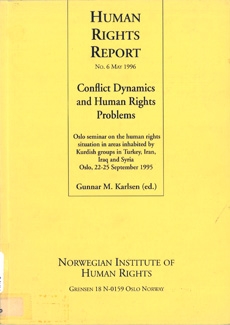|
PREFACE
This report of the international seminar on the human rights situation in areas inhabited by Kurdish groups in Iran, Iraq, Syria and Turkey, held in Oslo 22-25 September 1995, has been prepared to present the main points at the seminar according to the view of the editor. The seminar lasted for two and a half day, and trying to capture everything which happened would make the report too voluminous. The priority has been to cover the most relevant points from a human rights perspective.
The report is not commonly agreed upon by the participants, and although the editor has tried to render all viewpoints as accurate as possible, the report should not be interpreted as binding upon any of the participants.
The Norwegian Institute of Human Rights would like to thank all individuals and institutions which supported its efforts to make the seminar a useful one. The Institute would also like to thank the Norwegian Royal Ministry of Foreign Affairs for its financial support of the seminar.
Last, but not least, the Institute would like to thank all those who attended the seminar, and participated in creating an atmosphere of dialogue and constructive debate.
Introduction
22-25 September 1995 the Norwegian Institute of Human Rights arranged an international seminar (called “the Oslo seminar” in this report) on ways to improve respect and protection of human rights in areas inhabited mainly by Kurds, i.e. Southeast Turkey, Northern Iraq and some parts of Iran and Syria.
Explaining the purpose and organisation of this seminar, a few words about the Institute is necessary. It is organised as a centre under the Collegium of the University of Oslo, and its primary objective is to contribute to the implementation of internationally recognised human rights standards - through research, information and documentation. At present the overall aim of the Institute’s activities is defined as studying and contributing to processes of democratisation. Since the Institute believes that securing human rights for all groups of society is a necessary condition for democratisation, the seminar topic fits well into this overall aim of the Institute.
The great concern for the human rights situation of the Kurd among Norwegian Parliament members and some professional organisations in Norway, adds to this picture and gives a broader context for the arrangement of the seminar. However, although the seminar was enhanced by Norwegian politicians, and financially supported by the Norwegian Ministry of Foreign Affairs, its planning and carrying out was entirely the responsibility of the Institute.
It was early decided that the human rights situation in Turkey should be given most attention; not only because Turkey has the largest Kurdish population, but also since it was believed that the potential for improvement was greatest here. Turkey is also a member of the Council of Europe and a party to its main human rights instruments.
On this background the Institute decided to invite a large number of Turkish participants - in addition to a selected group of Kurdish intellectuals and politicians -from different spheres of society: non-governmental organisations, political parties, mass media, trade unions, trade organisations and academics. During the summer of 1995 it became clear that the Turkish participation, despite the efforts of the Institute, would be rather limited in number. It was then decided to include more Kurdish participants; most of them with ties to Turkey.
The Institute intended the seminar not only to be an occasion to explore the facts about the situation in the aforementioned areas inhabited by Kurds, but also an opportunity to discuss the causes of human rights violations, and how to improve the situation. The media and human rights organisations report on grave human rights violations against civilians in all the areas concerned: arbitrary arrest and imprisonment, torture, extrajudicial executions and “disappearances”. Acts of terror, regardless who commits them, also give grounds for serious concern.
The seminar intended to focus on dialogue and constructive solutions within the present state borders in the area. Decentralisation of power and the application of linguistic and cultural rights recognised in international human rights law, were other central aspects.
…..
| 